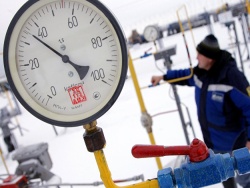
Analysts at Brean Capital”s Russ Certo, together with experts from Bloomberg have produced a very comprehensive analysis of current market risks.
The results of their work reflect not only a greater decline in the global capital market, but also provide an explanation of why investors prefer risk-averse, leaving the Central banks to understand each other.
Investors withdraw from the capital market because of the extremely negative assessments of the prospects against the backdrop of global uncertainties surrounding monetary policy and the political decisions taken in the Wake of the financial crisis of 2007-2009, on the backdrop of reduced trading volumes.
“Firstly, it is China, then Japan, and after — ECB. When the smell of fried, speculators prefer to leave the game,” says managing Director Russ Certo of Brean Capital.
Major banks around the world reduce the volume of trading operations in an effort to reduce costs amid growing regulatory requirements.
“Investors are stewards of other people’s money and do not want to invest money in a financial pyramid”, – said the expert.
Speculators in China receded as quickly as it moved in the volume of trades on the three major exchanges of the country, which currently is almost half of that, which was as of April 22.
Strategic risks
The main risk is that global financial markets more vulnerable to political shocks and stock indices are near historic highs, and the yield of sovereign bonds near record low levels.
Market participants lose confidence, especially in the case of unexpected decisions of the Central Bank, as was the case with the Central Bank of Japan, which was unable to increase monetary stimulus on April 27.
The risk the fed: fed says markets that have increasing interest rates in a fragile world economy, or before the market price will begin to rise; the first will be more and more dependent on risky assets, while the second will create a negative shock.
The risk of the ECB: quantitative easing program remains ineffective as current account, excess liquidity is near record highs.
The risk of the Bank of Japan: Bank of Japan loses control of the appreciating yen, also he still is unable to promote growth or inflation, fiscally policy of “abenomics”, which remains ineffective.
The constant risk Basel III: regulations also compel all commercial banks to hold liquid assets of higher quality, exacerbating the shortage of liquidity.
Political risks
Brexit
Uncertainty overshadows the impact of Brexit on the markets, the British pound or economic policy; analysis of short-term effects of Brexit will be published this month.
Half of the respondents in Belgium, France, Germany, Hungary, Italy, Poland, Spain and Sweden believes that their country should hold a referendum on the question of being in the EU, according to a survey conducted by Ipsos Mori, published on 9 may.
The survey shows that 40% of Britons would vote to remain in the EU, 41% is to leave the EU. The poll, conducted last week, showed that for staying in the EU would be 44% of respondents to leave the EU — 45%.
The British pound, arising from Brexit risk, may be significantly below current levels, some analysts said that the strengthening of the pound reflects the great confidence that the British will favour staying in the EU, although others warn it could reflect a wrong understanding of the latest public opinion polls.
Central and Eastern Europe may be the most vulnerable to the risk of Brexit, as Poland is the largest net receiver of EU funds, while the UK is the third biggest net-payer.
“The tempest” in the EU
The risk that the EU is unable to stop the flow of migrants is growing rapidly and contributes to rising nationalist pathos and internal strife.
The growing risk of the financial system of European regions is becoming increasingly problematic against the background of increased political uncertainty, rising bad loans and slowing economic growth.
Italy: will fail to achieve the goal of reducing debt; the quality of Bank assets continues to deteriorate and the Fund Atlante is ineffective.
Greece: the country risks not to comply with the terms of the agreement to reduce the debt burden, forcing her to hold another series of restructurings.
Spain: election of 26 June, creating another impasse, there is also the risk of creating anti-government coalition aimed to unseat Prime Minister Rajoy.
A hard landing of China’s economy
The risk that China could produce more than a hard landing of the economy than expected, also increases. The mouthpiece of the Communist party of China newspaper People’s Daily stated that China must set a goal of deleveraging in the economy that can affect the rate of economic growth.
China may lose control of the deleveraging that will lead to increased risks associated with increased volatility of the financial market and / or economic hard landing.
Also, China may lose control over the outflow of capital and will be forced to allow the yuan to depreciate faster; imports from Hong Kong increased by 204%, which reflects a significant outflow of capital.
The risk of selling reserves in the Chinese stock market continues. The reserves increased by $11 billion to $3,316 trillion, although this was mainly associated with the reassessment on the background of the fall of the dollar.
The intensity of futures trading on the Chinese commodity exchanges is slowing, although it is one of the most liquid markets in the world.
Chinese companies working in the field of metallurgical and mining or coal industry should return 239,6 billion yuan in the three months to June, inclusive.
Oil prices
Low prices can continue to put additional pressure on oil companies in the US and lead to more defaults, which will provoke a credit problem for small banks, private equity firms and hedge funds; this will increase the potential for downward pressure on other assets sold to cover losses.
At the upcoming summit in June, OPEC can set limitations on the volume of oil production after a failure of negotiations on the freezing of production last month, which led to another decline in oil prices.
The decline in oil prices may force the Saudis to continue to ispolovat accumulated reserves in order to protect the national currency pegged to the dollar. Reserve assets of $587 billion, compared with $745 billion in August 2014.
The Russian economy is struggling with the longest recession in over two decades. As a result, she may experience a more protracted pressure, as oil is the basis of the export earnings of the country.
The slowdown in US economic recovery
If you do not take into account the political uncertainty, there is a risk that economic growth in the US may slow down further, which will lead to lower asset prices. This, in turn, will lead to greater economic weakness.
To report results over two thirds of companies in the S&P 500 index that have reported earnings this season, it becomes clear that the results do not allow to assume a speedy recovery after the fourth consecutive quarterly decline.As of may 6, the share of corporate profits has shown a decline in profits for the first quarter by 7.9%. In the US there had been 40 corporate defaults as of the end of April, which grew at the fastest rate since 2009; this year it was noted 53 global values against 67 in 2009.
The head of Puerto Rico Padilla warned that, starting in July, bond investors will face a decline, if Congress does not adopt the laws; at the same time disturbing of the municipal funds, such as Oppenheimer, which emit 43% of its portfolio securities, Puerto Rico.








